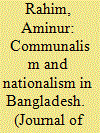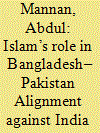| Srl | Item |
| 1 |
ID:
080312


|
|
|
|
|
| Publication |
2007.
|
| Summary/Abstract |
The scholars of the South Asian politics have tended to take a one-dimensional view in national formations in Bangladesh, that is, identity formation is seen as either instrumental or primordial. Relying on the conceptual framework of social formation, this article argues that `Bengali' and `Muslim' are complementary. Group solidarity itself is seen as a social process that links to the everyday world that provides the space for the identity formation. It transcends the narrow utilitarian principle to strive for securing and organizing power itself
|
|
|
|
|
|
|
|
|
|
|
|
|
|
|
|
| 2 |
ID:
155178


|
|
|
|
|
| Summary/Abstract |
Territorial conflicts have been among the most important fallouts of the modern
nation states, with the states advancing different kinds of justifications to claim
the territory in conflict. These justifications play an important role in shaping the
actions of the states and the solutions thereof. The states propound their claims
on ethnic, strategic, geographic proximity, economic and religious considerations.
As a result, there is an acute need to study the territory in conflict, not in terms of
objective attributes but as outcome of a dynamic relationship that exists between
an area, social processes and ideologies that give it meaning. This dynamic relationship
is visible in the territorial justifications that Pakistan has raised over Kashmir.
The justifications put forward by Pakistan are not grounded in a particular claim
like the two-nation theory, but they have varied with time to hide underlying economic,
geostrategic and other related motives in changing global and domestic
context. Shifting the claims from religious to strategic or economic basis affects the
nature of the solutions envisioned. The solutions in context of changing claims go
beyond Pakistan’s officially held position of United Nations sponsored plebiscite.
|
|
|
|
|
|
|
|
|
|
|
|
|
|
|
|
| 3 |
ID:
160014


|
|
|
|
|
| Summary/Abstract |
This article engages with Bangladesh’s policy of seeking alignment with Pakistan, pursued by the Bangladesh Nationalist Party (BNP) government in different tenures from the 1990s on. In this endeavour, the article takes into account the BNP’s politics of Islamic identity as a key variable of analysis. This identity factor tacitly presents Bangladesh, Pakistan and India as ‘Muslim Bangladesh’, ‘Muslim Pakistan’, and ‘Hindu India’, respectively. It frames ‘Muslim Pakistan’ as a mutual ally of ‘Muslim Bangladesh’ and shares with Pakistan a view of ‘Hindu India’ as the enemy-other. It operates in foreign policy through domestic politics in Bangladesh, wherein for the BNP, being anti-Indian is synonymous with being pro-Islam. It is claimed in this article that this politics of Islamic identity draws Bangladesh into an alignment with Pakistan, dragging Bangladesh into Pakistan’s own conflict with India.
|
|
|
|
|
|
|
|
|
|
|
|
|
|
|
|